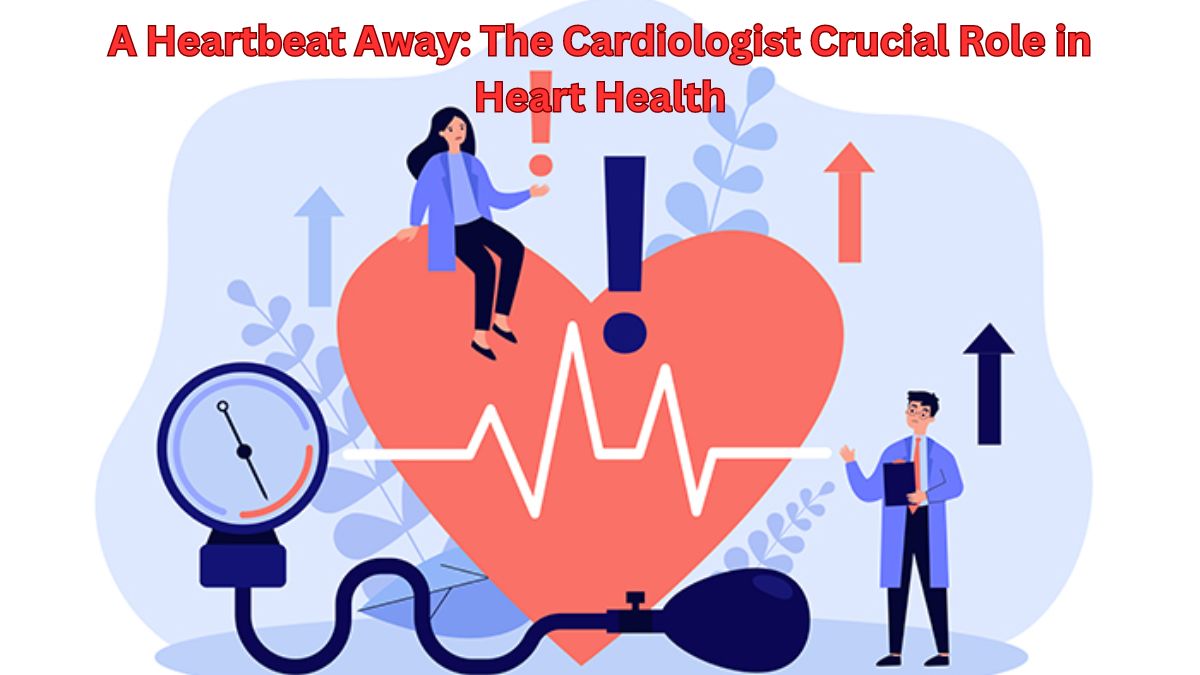In a world where heart disease remains the leading cause of death, understanding the vital role of cardiologist has never been more critical. These medical maestros don’t just treat ailments; they orchestrate a symphony of care that harmonizes prevention, diagnosis, and treatment to keep our hearts beating strong. Imagine having an expert by your side who not only understands the complexities of cardiovascular health but also empowers you with knowledge to make heart-smart decisions every day. Join us as we delve into the fascinating realm of cardiology, uncovering how these unsung heroes are transforming lives one heartbeat at a time!
Introduction: Importance of heart health and the role of cardiologists
When it comes to our health, few things are as crucial as the well-being of our hearts. Often referred to as the engine of the body, a healthy heart keeps everything running smoothly. But what happens when something goes wrong? That’s where cardiologists step in. These dedicated specialists play a vital role in diagnosing and treating heart conditions, ensuring that millions can enjoy healthier lives. Understanding their expertise can empower us all to take better care of our most important organ. Let’s explore who cardiologists are and why their work is indispensable for maintaining optimal heart health.
What is a cardiologist?
A cardiologist is a medical doctor specializing in diagnosing and treating heart-related conditions. Their expertise extends to the entire cardiovascular system, which includes the heart, arteries, veins, and capillaries.
These professionals play a crucial role in managing illnesses like hypertension, arrhythmias, coronary artery disease, and heart failure. They work tirelessly to help patients understand their risks and improve their cardiovascular health.
Cardiologists often collaborate with other healthcare providers to ensure comprehensive care. They may also conduct research to advance knowledge in cardiac medicine.
With their keen understanding of complex cardiac issues, these specialists are essential for anyone experiencing symptoms related to heart disorders or seeking preventive care measures.
Education and training required to become a cardiologist
Becoming a cardiologist is a journey that requires extensive education and training. It typically starts with earning a bachelor’s degree, usually in a science-related field. This foundation is crucial for understanding complex medical concepts.
Next comes medical school, where aspiring doctors spend four rigorous years studying medicine. Here, they gain essential knowledge about human anatomy, physiology, and various diseases.
After obtaining their medical degree, the future cardiologist enters residency training in internal medicine. This phase lasts three years and provides hands-on experience treating patients under supervision.
Following residency, candidates pursue fellowships specifically focused on cardiology. These specialized programs can take an additional three to four years to complete. During this time, they delve deep into cardiovascular medicine while honing their skills through practical experience.
This extensive educational path equips cardiologists with the expertise needed to diagnose and treat heart conditions effectively.
Common heart conditions treated by cardiologists
Cardiologists specialize in diagnosing and treating a variety of heart conditions. One common issue is coronary artery disease (CAD), where the arteries become narrowed, limiting blood flow to the heart. This can lead to angina or even heart attacks.
Another prevalent condition is arrhythmia, which involves irregular heartbeats. These can manifest as palpitations or more serious complications that affect overall health.
Heart failure is also frequently managed by cardiologists. It occurs when the heart struggles to pump enough blood, leading to fatigue and fluid buildup in the body.
Valvular heart diseases involve malfunctioning valves that disrupt normal blood flow within the heart. Cardiologists assess these issues through advanced diagnostic tools and recommend appropriate treatments.
Lastly, congenital heart defects are addressed by specialists who work with patients from infancy through adulthood, ensuring ongoing care for lifelong conditions. Each case requires tailored approaches for optimal outcomes.
Diagnostic tests and procedures used by cardiologists
Cardiologists employ a variety of diagnostic tests to assess heart health. Each test offers unique insights into the functioning of the heart and circulatory system.
One common procedure is an electrocardiogram (EKG or ECG). This non-invasive test records the electrical activity of the heart, identifying irregular rhythms or other issues.
Another frequently used method is echocardiography. This ultrasound technique provides detailed images of the heart’s structure and function. It helps cardiologists evaluate conditions such as valve disease or cardiomyopathy.
Stress testing assesses how well your heart performs under physical exertion. Patients typically walk on a treadmill while their hearts are monitored, revealing any potential problems that might not appear at rest.
For more intricate evaluations, catheterization allows direct access to coronary arteries. Through this procedure, doctors can visualize blockages and determine necessary interventions with precision. These diagnostic tools are crucial for understanding cardiovascular health comprehensively.
Treatment options and interventions offered by cardiologists
Cardiologists offer a range of treatment options tailored to individual patient needs. Medications are often the first line of defense, targeting conditions like high blood pressure and cholesterol levels.
For more complex issues, procedures such as angioplasty or stenting may be necessary. These minimally invasive techniques help open blocked arteries and restore proper blood flow.
In some cases, surgical interventions become essential. Bypass surgery can create new pathways for blood circulation when arteries are severely narrowed or blocked.
Beyond these medical approaches, cardiologists emphasize lifestyle changes. Nutrition counseling and exercise recommendations play a crucial role in long-term heart health.
Patients might also explore cardiac rehabilitation programs designed to aid recovery after major events like heart attacks or surgeries. This holistic approach ensures comprehensive care for every aspect of cardiovascular well-being.
Lifestyle changes for maintaining heart health
Maintaining heart health is largely influenced by lifestyle choices. Simple changes can make a significant difference.
Incorporating regular physical activity helps strengthen the heart muscle. Aim for at least 150 minutes of moderate exercise each week, such as brisk walking or cycling.
A balanced diet is equally crucial. Focus on whole foods like fruits, vegetables, lean proteins, and whole grains. Reducing sodium intake and limiting processed foods can lower blood pressure and cholesterol levels.
Stress management also plays a vital role in cardiovascular health. Techniques like mindfulness meditation or yoga can help keep stress levels in check.
Don’t forget about sleep; quality rest supports overall well-being. Strive for 7-9 hours per night to allow your body to recover effectively.
Lastly, avoiding tobacco use and moderating alcohol consumption are essential steps toward keeping your heart healthy for the long term.
The importance of regular check-ups with a cardiologist
Regular check-ups with a cardiologist are essential for everyone, especially those at risk of heart disease. These visits provide an opportunity to monitor your heart health closely.
During these appointments, cardiologists can identify potential issues before they become serious problems. Early detection is crucial in preventing complications that could arise from undiagnosed conditions.
Moreover, routine assessments help to establish personalized care plans tailored to individual needs. This ongoing relationship allows doctors to adjust treatments and recommendations as necessary.
Patients receive valuable education about lifestyle changes that promote better heart health during these consultations. It’s not just about treatment; it’s about prevention and empowerment.
Building a rapport with your cardiologist fosters trust and open communication. Feeling comfortable discussing concerns can lead to more effective management of cardiovascular health over time.
Debunking common misconceptions about cardiology
Many people hold misconceptions about cardiology and what cardiologists do. One common myth is that only older adults need to see a cardiologist. Heart health matters at every age, and early intervention can prevent severe issues later in life.
Another misconception is that all heart problems are obvious. In reality, many conditions develop silently without noticeable symptoms. Regular check-ups can catch these issues before they escalate.
Some also believe that seeing a cardiologist equals surgery or invasive procedures. While interventions may be necessary, many patients find relief through lifestyle changes or medications alone.
Lastly, some think cardiovascular health is solely genetic. While genetics play a role, factors like diet and exercise significantly impact heart health too. Understanding these points helps demystify the vital work of cardiologists and encourages proactive heart care for everyone.
Conclusion
The cardiologist plays a crucial part in our health journey. They are the experts who navigate the complexities of heart disease and work tirelessly to ensure our hearts function optimally. With their extensive training, they bring both knowledge and compassion to the table.
Regular visits to a cardiologist can lead to early detection of potential issues, often before symptoms arise. This proactive approach is essential for maintaining heart health over time. Lifestyle modifications suggested by these professionals can significantly impact overall well-being too.
Understanding common misconceptions about cardiology can encourage more people to seek care when needed rather than delaying treatment out of fear or misinformation. Knowledge is power, especially when it comes to something as vital as heart health.
By fostering a relationship with a trusted cardiologist, you empower yourself on your path toward better cardiovascular health. Prioritizing these check-ups not only enhances individual wellness but also contributes positively to community health at large. Our hearts deserve that attention and care; let us give them what they need through expert guidance and informed choices.
Read more from Global ranker news


Somebody essentially help to make significantly articles Id state This is the first time I frequented your web page and up to now I surprised with the research you made to make this actual post incredible Fantastic job
Your blog is a constant source of inspiration for me. Your passion for your subject matter is palpable, and it’s clear that you pour your heart and soul into every post. Keep up the incredible work!